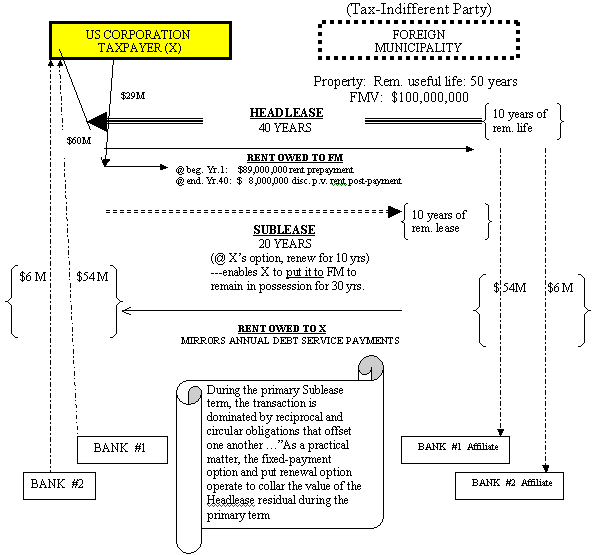LISTED TRANSACTIONS
Listed Transaction #17
(LILO)
Lease-In/Lease Out (LILO) Transactions
IRS Rev. Ruling 2002-69

In issuing Rev. Ruling 2002-69, the IRS ruled that the taxpayer in the above referenced transaction could not deduct the rent paid (under the Headlease) or interest paid or incurred (on the borrowings from the banks) in a lease-in/lease-out transaction that is properly characterized as conferring only a future interest in the property. As noted in the ruling, the IRS states its view that “(w)here parties have in form entered into two separate transactions that result in offsetting obligations, the courts often have collapsed the offsetting obligations and recharacterized the two transactions as a single transaction.”
In the ruling, the IRS states its belief that the Headlease and Sublease impose offsetting obligations that must be disregarded, regardless of whether other components of the LILO transaction are respected. During the first 20 years of its term, the Headlease confers to X a right to use the property that is immediately reversed by the Sublease grant to FM of substantially the same right to use property. In the LILO transaction, the Sublease interest retained by FM is of the same nature as the Headlease interest conveyed to X. Because the transfer and retransfer of the right to possess the property for the first 20 years are disregarded as offsetting obligations, the transaction that remains is, at best, a transfer of funds from X to FM in exchange for FM’s obligation to repay those funds and provide X the right to begin to lease the property in 20 years.
As for any rental deduction, the IRS notes how X did not acquire a current leasehold interest in the property. The $29 million portion of the Headlease prepayment was viewed by the IRS as a payment for X’s right under the Headlease to lease the property 20 years hence for a term of 20 years, and therefore, deductible over the 20-year residual term of the Headlease. The IRS ruled that the remainder of the Headlease prepayment of $60 million must be disregarded, because the loans that purportedly financed this portion of the Headlease prepayment were without substance. Neither X nor FM obtained the use of the “borrowed” funds. The loans purportedly made to finance X’s acquisition of the Headlease interest, but that interest is substantially offset by an independent Sublease with the Headlessor. What remains can only be enjoyed after 20 years and after the loans have been “repaid” using “rents” from a Sublease that itself lacks substance. Thus, the IRS disregarded the purported loans.
Holding: “The taxpayer may not deduct currently rent or interest paid or incurred with respect to a LILO transaction that properly is characterized as conferring only a future interest in the property. Where appropriate, the IRS states that it will continue to disallow tax benefits claimed in connection with LILO transactions upon other grounds, including that the substance over form doctrine requires their recharacterization as financing arrangements and that they are to be disregarded for lack of economic substance.”
NOTE: The IRS goes on to state the following as to the applicability of the ruling: “Although this ruling refers to a foreign municipality and its property, the analysis and holding apply as well to LILO transactions that involve or include domestic tax-exempt or tax-indifferent entities.”
If you believe that you may have engaged in a transaction that is the same or substantially similar to the transaction described above, Federal law may require you to disclose your and other parties’ participation in any such “listed transaction” on IRS Form 8886. For more information about Federal law requirements, please contact us.
